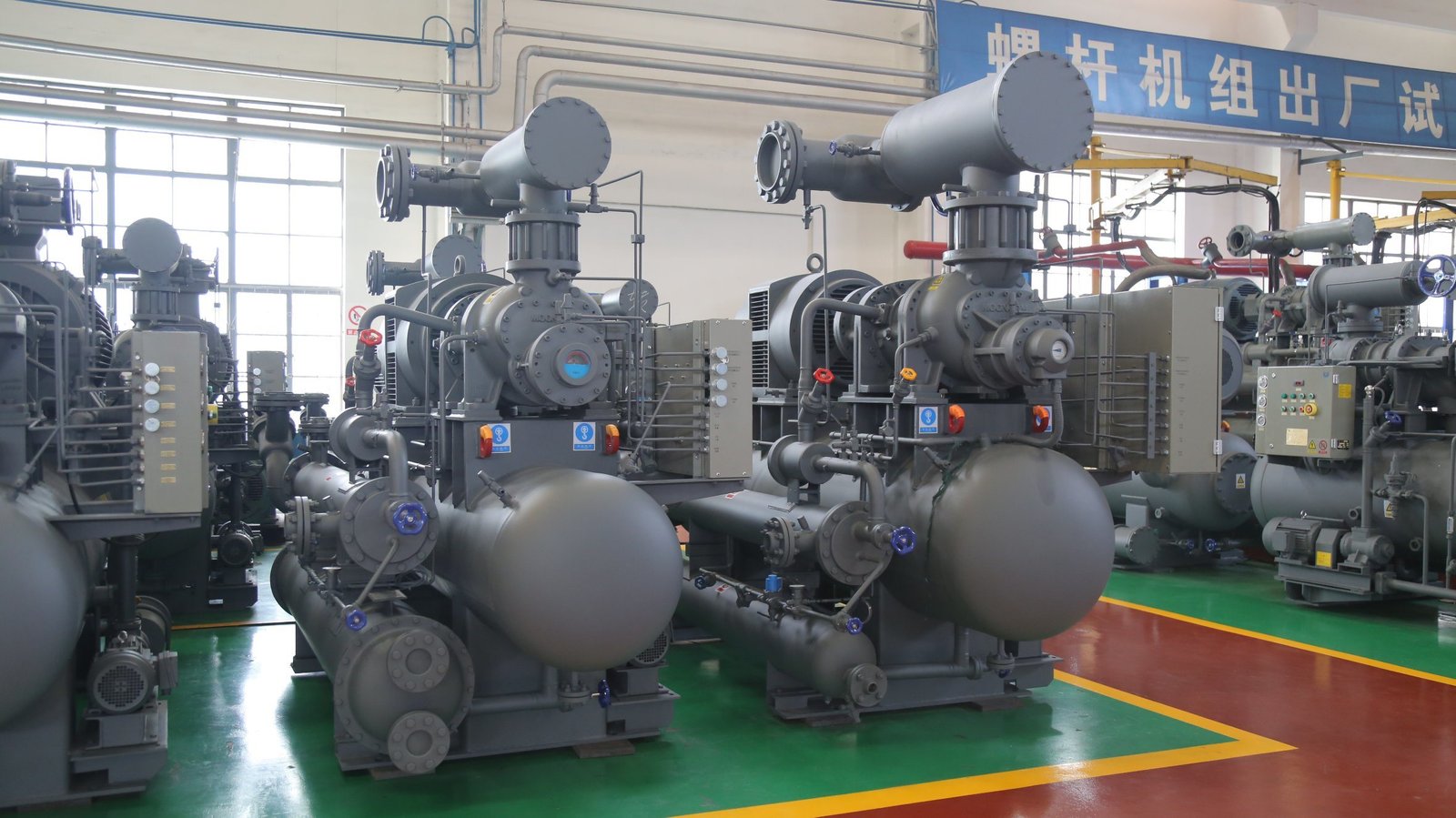
How to Choose the Best Ammonia Compressor for Your Industrial Needs
- Jul 02, 2024
- | 22
Choosing the right ammonia compressor for your industrial needs is a critical decision that impacts both operational efficiency and safety. Ammonia compressors are essential components in various industries, including refrigeration, air conditioning, and chemical processing. This comprehensive guide will help you understand the key factors to consider when selecting the best ammonia compressor for your specific requirements.
Introduction
Ammonia compressors play a vital role in various industrial applications by enabling efficient and reliable cooling and refrigeration processes. Selecting the right compressor is essential to ensure optimal performance, energy efficiency, and safety. This blog will guide you through the critical aspects to consider when choosing an ammonia compressor, helping you make an informed decision that meets your industrial needs.
1. Understanding Ammonia Compressors
What is an Ammonia Compressor?
An ammonia compressor is a mechanical device that increases the pressure of ammonia gas by reducing its volume. This process is crucial in refrigeration and air conditioning systems, where ammonia is used as a refrigerant due to its high efficiency and eco-friendly properties.
Types of Ammonia Compressors
There are several types of ammonia compressors, each with its own set of advantages and applications:
- Reciprocating Compressors: These compressors use pistons driven by a crankshaft to deliver high-pressure ammonia gas. They are known for their robustness and ability to handle varying loads.
- Screw Compressors: Utilizing two interlocking helical rotors, screw compressors are efficient and suitable for continuous operation. They are ideal for large-scale industrial applications.
- Centrifugal Compressors: These compressors use a rotating impeller to impart velocity to the ammonia gas, converting kinetic energy into pressure. They are best suited for high-capacity applications.
- Rotary Vane Compressors: Featuring a rotor with vanes that move in and out, these compressors provide a smooth flow of ammonia gas and are suitable for smaller systems.
2. Key Factors to Consider
Capacity and Size
The capacity of the ammonia compressor should match your industrial requirements. Undersized compressors may lead to inadequate cooling, while oversized units can result in higher energy consumption and operational costs. It's essential to conduct a thorough analysis of your cooling load requirements to determine the appropriate compressor size.
Energy Efficiency
Energy efficiency is a critical factor in choosing an ammonia compressor. High-efficiency compressors can significantly reduce operational costs and minimize environmental impact. Look for compressors with high Coefficient of Performance (COP) and Energy Efficiency Ratio (EER) ratings. Additionally, consider features like variable speed drives (VSDs) that adjust the compressor speed based on demand, further enhancing energy savings.
Reliability and Durability
Industrial operations demand reliable and durable equipment. Choose compressors from reputable manufacturers known for their robust construction and longevity. Materials used in the compressor, such as high-quality steel and advanced coatings, can enhance durability and resistance to wear and corrosion.
Maintenance Requirements
Regular maintenance is essential to ensure the longevity and optimal performance of ammonia compressors. Consider compressors with easily accessible components and user-friendly designs that simplify maintenance tasks. Some compressors come with advanced monitoring systems that provide real-time data on performance and potential issues, aiding in proactive maintenance.
Safety Features
Safety is paramount when dealing with ammonia, a toxic and flammable substance. Ensure the compressor you choose has comprehensive safety features, such as pressure relief valves, emergency shut-off systems, and leak detection sensors. Compliance with industry safety standards and regulations is also crucial.
Cost and Budget
While initial cost is an important consideration, it's essential to evaluate the total cost of ownership, which includes energy consumption, maintenance expenses, and potential downtime costs. Investing in a high-quality, energy-efficient compressor may have higher upfront costs but can lead to substantial savings in the long run.
3. Applications of Ammonia Compressors
Refrigeration
Ammonia compressors are widely used in industrial refrigeration systems, including food processing, cold storage, and ice production. Their high efficiency and low environmental impact make them ideal for large-scale refrigeration needs.
Air Conditioning
In industrial air conditioning, ammonia compressors provide effective cooling solutions for large buildings and facilities. Their ability to handle significant cooling loads makes them suitable for various commercial and industrial applications.
Chemical Processing
In the chemical industry, ammonia compressors are essential for processes such as ammonia synthesis, urea production, and petrochemical refining. Their reliability and efficiency are critical in maintaining consistent process conditions.
4. Comparing Different Brands
Leading Manufacturers
Several manufacturers specialize in ammonia compressors, each offering a range of models and features. Some of the leading brands include:
- GEA Group: Known for their high-quality, energy-efficient screw compressors.
- Johnson Controls: Offers a wide range of reciprocating and screw compressors with advanced control systems.
- Danfoss: Provides reliable and durable compressors with a focus on innovation and sustainability.
Brand Reputation
Consider the reputation of the manufacturer in the industry. Look for reviews and testimonials from other industrial users to gauge the reliability and performance of their compressors. Established brands often have a track record of delivering high-quality products and excellent customer support.
Warranty and Support
A comprehensive warranty and robust customer support are essential when investing in an ammonia compressor. Ensure the manufacturer offers a warranty that covers major components and potential defects. Additionally, check the availability of technical support and spare parts to minimize downtime in case of maintenance or repairs.
5. Installation and Maintenance Tips
Proper Installation
Proper installation is crucial for the optimal performance and longevity of ammonia compressors. Follow the manufacturer's guidelines and ensure the installation is carried out by qualified professionals. Key installation considerations include:
- Location: Install the compressor in a well-ventilated area to prevent overheating and ensure easy access for maintenance.
- Foundation: Ensure a solid and vibration-free foundation to minimize operational noise and wear on components.
- Piping: Use appropriate piping materials and sizes to maintain efficient flow and minimize pressure drops.
Routine Maintenance
Regular maintenance is essential to keep your ammonia compressor in top condition. Develop a maintenance schedule that includes:
- Inspection: Regularly inspect components such as valves, seals, and bearings for signs of wear and tear.
- Lubrication: Ensure proper lubrication of moving parts to reduce friction and prevent premature failure.
- Cleaning: Keep the compressor and surrounding area clean to prevent dust and debris from affecting performance.
- Monitoring: Use advanced monitoring systems to track performance parameters and detect potential issues early.
Conclusion
Choosing the best ammonia compressor for your industrial needs involves careful consideration of various factors, including capacity, energy efficiency, reliability, maintenance requirements, safety features, and cost. By understanding the different types of compressors and their applications, you can make an informed decision that ensures optimal performance and long-term benefits.
Investing in a high-quality ammonia compressor from a reputable manufacturer can significantly enhance your industrial processes, providing reliable and efficient cooling solutions. Regular maintenance and proper installation are key to maximizing the lifespan and performance of your compressor.
In conclusion, the right ammonia compressor can contribute to improved operational efficiency, reduced energy costs, and enhanced safety in your industrial applications. Use this guide as a starting point to evaluate your needs and make the best choice for your specific requirements.





